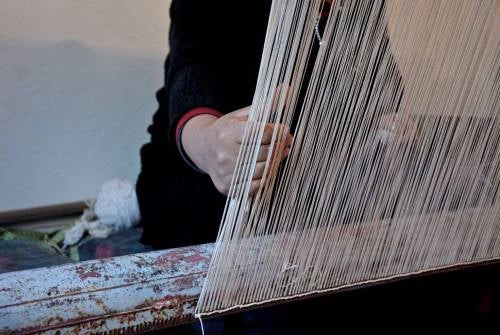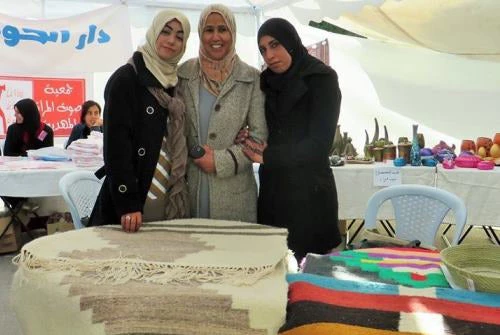
“It’s a way for us to earn money,” said 23-year-old Khawla Mahjbi who was unemployed before the start of the project. She explained how difficult it is finding a job in the Siliana region, which is one of Tunisia’s most socio-economically deprived areas with high unemployment and widespread poverty.
That’s why the initiative landed here. “The aim is to help the women reach greater levels of independence,” said Emma Djilali, one of the co-founders of the Aatik project, which is receiving funding from the Canadian Embassy.
Seated by the atelier’s weaving machines are 21 women, all handpicked based on interviews conducted during the autumn of last year. Half of the women are between 18 and 30 years old, whilst the rest are 30 to67 years old. Most of them lack formal education and were unemployed at the start of the project, which began in December. They have different levels of weaving experience, while some of the older women have weaved for years and were formerly employed by a local factory, others are beginners.
“The first days were difficult,” said Afef Oueslati, a 28-year-old mother of two. Before the project started she was home, unemployed, and knew very little about l weaving. The same goes for 22-year-old Hiba Wahbi. As a child she used to watch her mother and grandmother weaving and is now eager to learn new and efficient techniques, especially to be able to offer high-quality kilims.
As for 45-year-old Rabiha Riahi, she has many years of weaving experience. Riahi used to work in a factory until it shut down for unknown reasons years ago. She is particularly excited about the project’s sessions on design and color. In addition to weaving techniques, the women will be taught design, including everything from color matching to pattern matching. It’s, for example, important that the women learn to incorporate their own styles and local signatures in their kilims, adding some Tunisian authenticity (and value) to the craft, explained Djilali.
“They are eager to learn,” said 48-year-old weaver Layla Jendoubi who is assisting the women in the training. Tunisia is well-known for its rich, carpet weaving tradition . According to the National Office For Tunisian Handicrafts, Tunisia's craft sector employed 11% of the total workforce in 2013 . But despite its cultural heritage some fear the sector will become homogenized and modernized, and risks losing its authenticity. But Jendoubi has witnessed an increasing interest in the weaving business among young people in her hometown of Kef. Like the women in El Aroussa, she pointed out, it’s good for the younger women to learn traditional crafts from the older generations.

In addition to weaving techniques and design strategy the women will learn management skills, including communicating and marketing their products through an online e-commerce platform. It’s important that the women are capable of managing the online portal by themselves, including posting photos of new products and handling orders and shipment, explained Sophie Bergmann, Aatik’s second co-founder. “It is important that the women think of the project as their own.”
But most of the women don’t own a computer and some don’t have any Internet access. They are therefore unsure about how to manage Internet tools such as an email account. What use will it be? Asked some of the older women. But others, like Wahbi, are excited. It will, she hopes, connect her with new people. The aim is that with the atelier’s computer at their disposal, they will slowly gain confidence in managing their new business portal, from which customers from across the world can order the Siliana made kilims. Foreign customers will be able to place their order online, directly to the artisans, with the handmade kilims reaching their doorstep within a few weeks through international delivery services.
“There is no other project like this here,” said Rafika Haeni, the workshop coordinator. She sees potential in this type of project and is hoping it will be self-sustainable over the long-term and that there will be opportunities to expand to other parts of Tunisia.


Join the Conversation